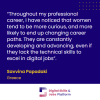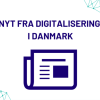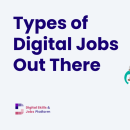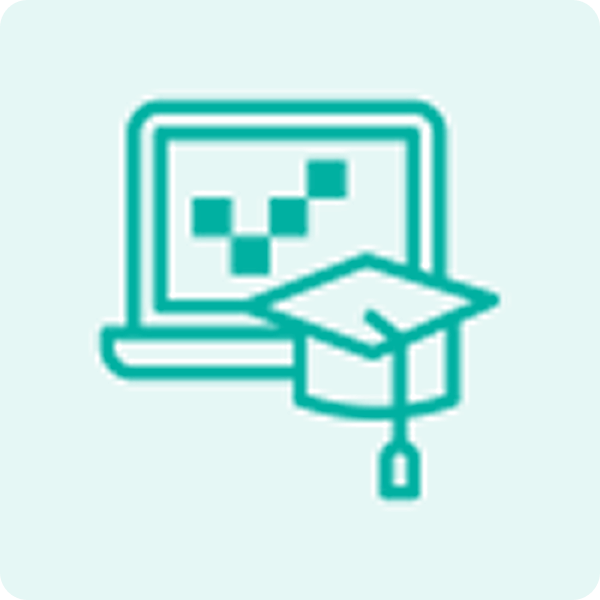Digital Story: the women reshaping our digital future
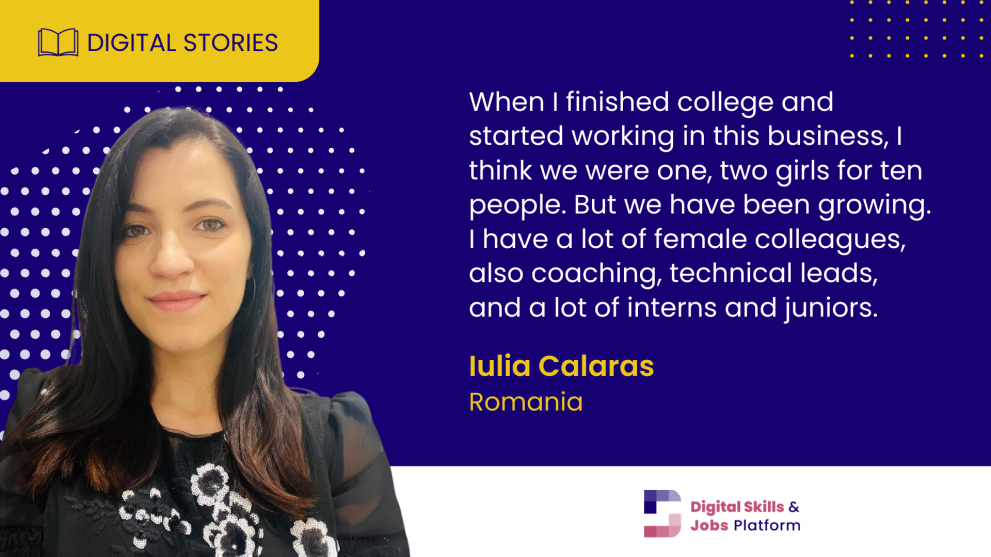
Seeing women work their way up to the very forefront of the digital domain is nothing short of inspiring. While the gender gap still very much remains, more and more women are choosing to go into the ICT field, spearheading innovation and breaking glass ceilings.
In today’s piece, we spoke to Iulia Calaras, Technical Lead (or Platform specialist, if you wish) at Publicis Sapient - a leading IT company based in Bucharest, handling a range of projects. Each day at Iulia’s job is different – but this is far from the only aspect that influenced her decision to embark on a career in tech.
Encoding the basics for a career in tech
Interested in what working in digital or IT is like? Looking at careers in the field of ICT? See what Iulia had to share with us.
Iulia, what is a technical lead, and what tasks does this entail?
My current role means I get to take part in the web development of various projects, but also have some leadership tasks, like implementing or designing project architecture from scratch to finish, or ensuring compliance with industry standards. There’s also some communication skills in the mix: I work within a project team and several clients at the same time, and do mentorship and coaching. Each year we take 2-3 interns that we then coach towards the skills they want to acquire. Imagine that my role entails I cover virtually all phases of a software project, from the initial analysis to developing and designing a solution, and then maintaining the application. If I have to choose the part I enjoy most though, I’d always pick programming.
How did you get to your current job? What did you study and how did your path so far look like?
In high school, I specialised in mathematics and informatics, which seemed more interesting than other more traditional profiles like humanities, or scientific ones like biology or chemistry. I actually wanted to be an architect, but then I got more interested in the subject. So I was already kind of on that path already, but having good teachers really helped inspire me. After graduating I applied to go to university in Bucharest (I’m from a smaller town in Romania, Galati).
The choice seemed easy: it was the capital so there were simply more opportunities there. I also did a Master’s, where I dabbled a bit with AI, trying to build a chess algorithm for my Master’s thesis using that chess game where you have the beat the computer. Algorithms are fun: and I enjoyed a lot that area. But somehow along the way, I always came back to back-end programming.
From scratch to a developer
What skillsets or knowledge do you see as essential for a career in ICT?
I think mathematics is very important for a career in ICT, and definitely a key component of programming. I know that it might seem boring and even scary to some people, who go “oh why do I even need to know this?” and I was also like that at first. But once you get to a certain point, you realise why you had to learn all of these different things to be able to program – somehow they all fit together. The informatics part, on the other hand, encompasses a lot of different areas, like databases, data structures, algorithms, and various programming languages.
You can also be flexible – once you go through all this in college, then you can decide to focus on an area you really like. And there are tons: you can be a database administrator specialist, a back-end programmer (like me), or a front-end programmer (a more creative role). Or perhaps you want to try being a Business Analyst, where you study the project’s needs through a closer lens, or you may want to become a Project Manager with your IT experience.
Any study tips for those thinking about a career in tech?
If you are younger and you want to embark on a career in tech, you need to first figure out what you are good at, and what you would like to do most. Pick a lane, study that for some time, and then build further. Working hard is also important: there’s no going around it. So, work, study, and take it seriously – the mathematics and informatics part at least. The programming language itself doesn’t matter that much: once you get the basics down, it’s just like learning German after English, i.e. you find similarities. Also, don’t be afraid to get a bit technical with the hardware part. When I was fifth grade, I got my first computer and I tore it apart. I wanted to look at it, put it back together, see what a floppy disk is, with all the curiosity you can imagine. And right now, with so many resources, the possibilities are really endless.
Then, if you have already done something else, and you’re looking to move to tech, there are tons of free courses online, digital platforms you can start learning from. Some of the best programmers at work have come from other disciplines, or lack college experience altogether, but they have made progress studying alone. Having a pet project is also really important: test it out, try to do something on your computer, and go through all project parts. Start small: I have this project. I want to make an application. Let’s do the login, add business criteria, the user system. “I want to have an area with a chat” – try building a chat module or something similar. Work hard, and you can achieve anything.
Is that your recipe for success?
I think a clear recipe for success in any field doesn’t really exist, right? Something I find interesting is the talent component, and I think I have it. You wouldn’t think about it in this way: it’s not like drawing a picture or playing an instrument, but there is certainly a degree of creativity and talent, meaning I find people around me that maybe struggle a bit more, or have to work harder than others, who just get things faster.
How have you seen the IT field growing to include more women? Has it changed?
It is definitely growing. I’m 34 and I’ve been working in the field for over 10 years now. I did a Bachelors and then a Masters, and by the time I finished college and started working for companies, I think we were 1 or 2 girls for every 10 people – so, a very low percentage. But I can see growth. I now have many female colleagues in such positions – as coaches, as technical leads – and a lot of interns and younger girls, which is great.
Pave your own way
So how can you build your own digital story? Like Iulia says, start with the basics. Try a MOOC, or an open course, like the famous 'CS50: Introduction to Computer Science', or check out what skills employers project as trending for the future.
Get more knowledge too. Check out our deep-dives on “Digital Jobs” and “Digital Experts” and learn about the different paths within the field of ICT. Find more exercises, quizzes and other bite-sized learning content materials to improve your digital competence further. Test your digital skills with our online test to see what you’ve already mastered, and what you still need to improve.
Feeling bold? Why not enrich your learning experience through new feature on the Digital Skills and Jobs Platform? Access our guided learning paths, jot down all inspiring ideas that come to mind, and when you’re ready for it – try starting out on your own.

